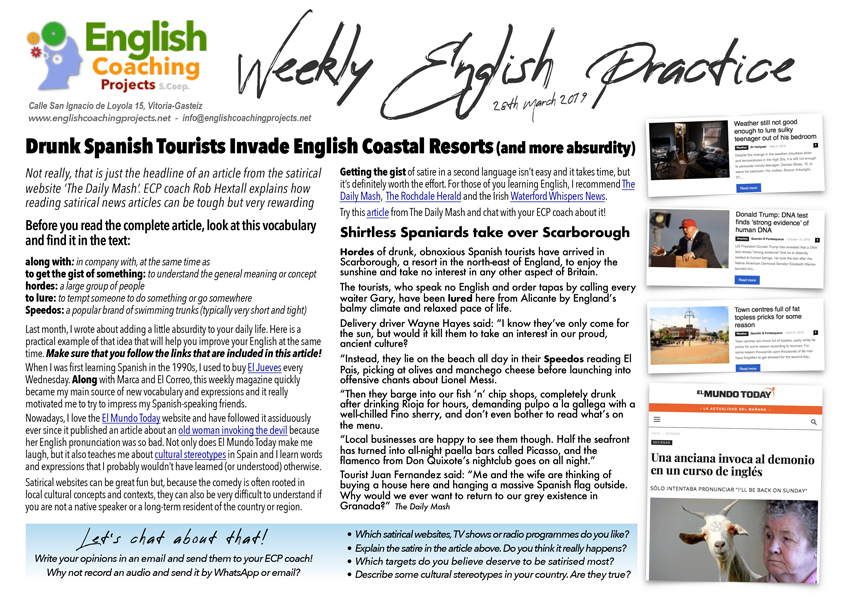In this week’s Weekly English Practice, ECP coach Rob talks about satire and why it is a great idea to read satirical news articles to improve your vocabulary and cultural awareness. Read this week’s WEP to find out more and to discover some great websites!
Click on the image to download the pdf
Drunk Spanish Tourists Invade English Coastal Resorts (and more absurdity)
Not really, that is just the headline of an article from the satirical website ‘The Daily Mash’. ECP coach Rob Hextall explains how reading satirical news articles can be tough but very rewarding
Before you read the complete article, look at this vocabulary and find it in the text:
along with: in company with, at the same time as
to get the gist of something: to understand the general meaning or concept
hordes: a large group of people
to lure: to tempt someone to do something or go somewhere
Speedos: a popular brand of swimming trunks (typically very short and tight)
Listen to the audio (refresh the page if it’s not visible)
Last month, I wrote about adding a little absurdity to your daily life. Here is a practical example of that idea that will help you improve your English at the same time. Make sure that you follow the links that are included in this article!
When I was first learning Spanish in the 1990s, I used to buy El Jueves every Wednesday. Along with Marca and El Correo, this weekly magazine quickly became my main source of new vocabulary and expressions and it really motivated me to try to impress my Spanish-speaking friends.
Nowadays, I love the El Mundo Today website and have followed it assiduously ever since it published an article about an old woman invoking the devil because her English pronunciation was so bad. Not only does El Mundo Today make me laugh, but it also teaches me about cultural stereotypes in Spain and I learn words and expressions that I probably wouldn’t have learned (or understood) otherwise.
Satirical websites can be great fun but, because the comedy is often rooted in local cultural concepts and contexts, they can also be very difficult to understand if you are not a native speaker or a long-term resident of the country or region.
Getting the gist of satire in a second language isn’t easy and it takes time, but it’s definitely worth the effort. For those of you learning English, I recommend The Daily Mash, The Rochdale Herald and the Irish Waterford Whispers News.
Try this article from The Daily Mash and chat with your ECP coach about it!
Shirtless Spaniards take over Scarborough
Hordes of drunk, obnoxious Spanish tourists have arrived in Scarborough, a resort in the north-east of England, to enjoy the sunshine and take no interest in any other aspect of Britain.
The tourists, who speak no English and order tapas by calling every waiter Gary, have been lured here from Alicante by England’s balmy climate and relaxed pace of life.
Delivery driver Wayne Hayes said: “I know they’ve only come for the sun, but would it kill them to take an interest in our proud, ancient culture?
“Instead, they lie on the beach all day in their Speedos reading El Pais, picking at olives and manchego cheese before launching into offensive chants about Lionel Messi.
“Then they barge into our fish ’n’ chip shops, completely drunk after drinking Rioja for hours, demanding pulpo a la gallega with a well-chilled Fino sherry, and don’t even bother to read what’s on the menu.
“Local businesses are happy to see them though. Half the seafront has turned into all-night paella bars called Picasso, and the flamenco from Don Quixote’s nightclub goes on all night.”
Tourist Juan Fernandez said: “Me and the wife are thinking of buying a house here and hanging a massive Spanish flag outside. Why would we ever want to return to our grey existence in Granada?” The Daily Mash
Let’s chat about that!
Write your opinions in an email and send them to your ECP coach!
Why not record an audio and send it by WhatsApp or email?
- Which satirical websites, TV shows or radio programmes do you like?
- Explain the satire in the article above. Do you think it really happens?
- Which targets do you believe deserve to be satirised most?
- Describe some cultural stereotypes in your country. Are they true?


